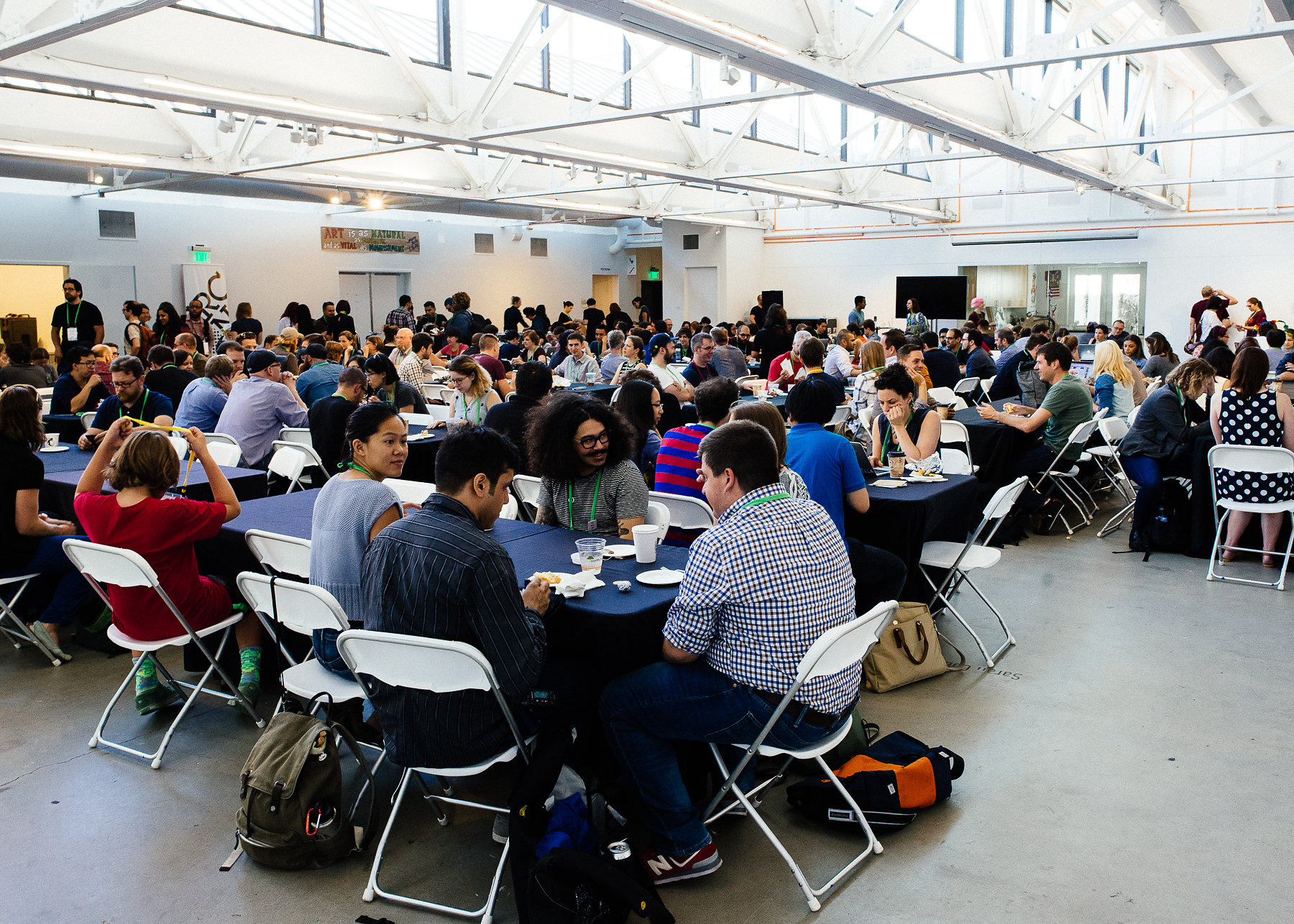How We Planned & Ran the SRCCON Travel Scholarships
by Erika Owens

Helping as many people as we can join the SRCCON crowd. (photo/Erik Westra)
At OpenNews, our one big event each year is SRCCON. We put a tremendous amount of effort into making it as inclusive and accessible as possible, considering everything from how to allocate tickets to the food to natural light in the session rooms. As organizers, we think about these details in order to free up the brain space of attendees to do what they come to SRCCON to do–have great conversations.
But first, they have to get to the event itself. One component of accessibility for an event like ours is a travel scholarship program to help defray travel costs for participants.
We created a travel scholarship program, budgeted for it, and fundraised for sponsors to support it. This post will walk through the process of how we administer the program and some of the lessons we’ve learned as we’ve evolved our program over the last three years.
Setting up the program
We began by doing research into existing programs run by other organizations. What were the requirements like? What type of scholarships did they give out? Who did they give them to?
We reviewed this research and came up with a structure that we could support with our current administrative capacity, and that met our goals. The scholarships page on our site lays out the details. We kept scholarships a flat $500 for travel costs, plus a free ticket. This year we also offered a small number of $1,000 scholarships, which went to international participants. In allocating the scholarships, as we informed applicants, we prioritized applications from members of communities underrepresented in journalism and technology, as well as those from people who would be unable to facilitate an accepted session without the scholarship.
In outreach about our ticket lottery this year, we also encouraged people to apply for the scholarship. Moving to a lottery this year, rather than selling tickets first-come first-served, gave us a longer time period to do outreach, both to enter the lottery and apply for scholarships.
As we conducted outreach for applicants, we also did outreach for sponsorships. Each year we’ve been able to get sponsor support for our scholarship program, ranging from $3,000 to $10,000, as the scale of the program has changed and we’ve explored different types of sponsor partnerships. WordPress has been a fantastic supporter of this effort each year.
The application and evaluation
We tried to keep the application pretty short and straightforward.
We evaluated each application on a few criterion:
-
Underrepresented—demographics
This is based on the applicant’s answers to questions about whether they are a member of under-represented communities in journalism tech. Applicants indicate if they identify as a woman, person of color, and/or member of another under-represented group. -
Underrepresented—organization
This is based on the applicant’s organization (or role in the case of something like a freelancer) and how well-represented that organization is at SRCCON and in the journalism tech community. -
Unable to attend without scholarship
This is also based on the applicant’s personal answer about their level of need and expected level of financial support, if any, from their employer. -
Selected as session leader
This is based on data we already have about whether the person will be leading a session at SRCCON. -
Meaningful contribution of skills
This was to give another dimension beyond org/session leadership—but in reality, basically every applicant will have a meaningful contribution of skills! It mostly operates in downgrading incomplete or uncompelling applications.
For each of those categories, we rated each application 0-3. In some cases, it was basically yes or no, e.g. 0 if not a session leader, 3 if a session leader. In other cases, there was a bit of subjectivity, such as for underrepresented organizations. That’s a judgement call based on how well-represented that person’s organization was at SRCCON and whether it was an organization we want to connect with more. I did a first pass rating each application on these categories, and summed the totals. I then resorted all of the applications based on their totals and shared the sorted list with the rest of the OpenNews staff to discuss selecting the final list of recipients.
Selecting the recipients
The rating rubric helped us getting a sense of the number of strong applications and level of need. This year we received 75 scholarship applications. Our initial scholarship budget was for 20 scholarships, but when we looked at the list, we could have just given scholarships to 20 session facilitators, and we didn’t want to do that. That’s not how we intended the scholarship program to work and we know there’s a lot of reasons why someone may not feel comfortable facilitating (especially if they’ve never attended before).
Given that there were far more strong applications than the budget available, we prioritized applications from facilitators, locals to Portland, and participants from underrepresented organizations. We were lucky to have some flexibility in our budget so we could find other funds for 6 additional scholarships, plus a new sponsorship from the Dow Jones News Fund for three of their alumni to attend. Another area of flexibility in our budget was offering a couple of ticket-only scholarships. So in total, we were able to help 29 people in attend SRCCON—and we know there’s need for even more support than that.
Administering the scholarships
We notified all scholarships applicants about whether they would receive a scholarship. For scholarship recipients, we requested an invoice listing the scholarship, amount, and their contact information to send them a check (or a wire for international). It takes about 3 weeks to process the invoice, so we tried to do this as quickly as possible in case people needed to receive the funds before they can purchase their travel. We sent scholarship recipients a link to register for the event for free as well. I tracked registrations and invoices to make sure people responded to us, that they were able to come, and monitored our budget.
After the event, we asked participants for their feedback and will use that for planning next year.
Looking ahead
Our SRCCON experience influenced our process for our ticket+travel scholarship program, so we’re continuing to learn and evolve on how to help people get to these in-person events.
The application and payment process has been pretty straightforward for us so far, with the help of our accounting colleagues (thanks, Alex!). But there are some other process considerations we’ll need to think through. The first one relates to session facilitators.
What does it mean if organizations won’t even cover the travel of their staff to speak at an event? Is there a way we can encourage orgs to do more to support professional development (and publicity for their work) of their teams? Aside from that, we may need to handle facilitator needs differently so that scholarships do remain for people who are not facilitators.
We also have to confront how the scholarships relate to the limited number of tickets for SRCCON. Being a session facilitator is one way to ensure you have a ticket. Receiving a scholarship is another. Otherwise, it’s a lottery. We got three times as many session proposals as we had space for sessions,and those were fantastic proposals. Maybe we should make proposing a session a consideration in scholarship applications too, even if the proposal was not selected. I have heard concerns about people applying to a scholarship or pitching a session just as a way of securing a ticket, and I don’t think we saw that happening, in any significant way, but it’s something to keep an eye on.
Another consideration with accessibility is that even $500 does not cover all travel costs. We did consider doing full-travel-cost scholarships, but in trying to balance helping more people attend with the real cost of travel, I think flat-rate scholarships will continue to be the best option for us. Instead of full scholarships, we’ll continue our work keeping out of pocket costs low for SRCCON so that $500 stretches as far as possible. We’ll continue to seek out lower-cost cities for hosting SRCCON and we’re looking at other ways to support regional and topical events so SRCCON isn’t the only place each year for people to experience SRCCON. Moving the conference to different geographic regions, as we have each year so far, is also a strategy to help with costs, so people can attend when SRCCON is closer to home.
We’ve also heard that scholarship recipients would like to get to know each other, so that they can get to know new people before the event and stay in touch after. We added a question to the form this year asking if people were ok with sharing their information and most people said yes. Next year, we’ll develop a plan for how to do that. Some conferences do scholarship or fellowship breakfasts and a meetup like that might be a nice addition to our scholarship program.
Scholarships have proven to be an important part of our strategy in keeping SRCCON as accessible as possible, so we’ll continue iterating on our work here to make sure it responds to participants’ needs. If you administer a program and have any suggestions, or just want to chat about what we’ve learned so far please feel free to reach out.
The latest from the OpenNews team
Looking back at 2023: We spent this year creating opportunity
How we connected at SRCCON 2023, and what we're carrying into next year
Read all our news in our OpenNews blog

